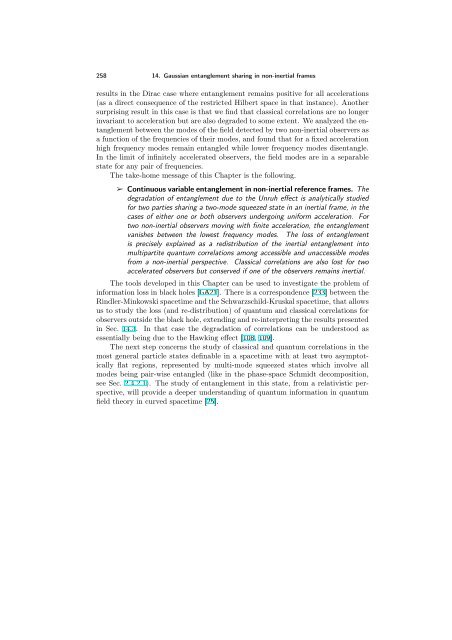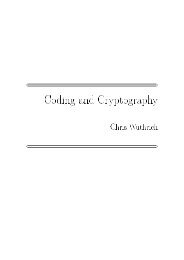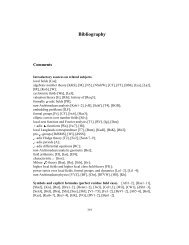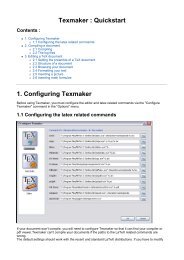- Page 1 and 2:
ENTANGLEMENT OF GAUSSIAN STATES Ger
- Page 3:
Life’s Entanglement. CR Studio In
- Page 7:
Abstract This Dissertation collects
- Page 10 and 11:
x Contents 2.2.2.2. Symplectic repr
- Page 12 and 13:
xii Contents 7.2.3. Tripartite enta
- Page 14 and 15:
xiv Contents Chapter 13. Entangleme
- Page 17 and 18:
Introduction About eighty years aft
- Page 19 and 20:
Introduction 5 Gaussian states. Imp
- Page 21:
Introduction 7 The companion Part V
- Page 24 and 25:
10 1. Characterizing entanglement a
- Page 26 and 27:
12 1. Characterizing entanglement w
- Page 28 and 29:
14 1. Characterizing entanglement W
- Page 30 and 31:
16 1. Characterizing entanglement F
- Page 32 and 33:
18 1. Characterizing entanglement a
- Page 34 and 35:
20 1. Characterizing entanglement i
- Page 36 and 37:
22 1. Characterizing entanglement e
- Page 38 and 39:
24 1. Characterizing entanglement n
- Page 40 and 41:
26 1. Characterizing entanglement p
- Page 43 and 44:
CHAPTER 2 Gaussian states: structur
- Page 45 and 46:
2.1. Introduction to continuous var
- Page 47 and 48:
2.2. Mathematical description of Ga
- Page 49 and 50:
2.2. Mathematical description of Ga
- Page 51 and 52:
2.3. Degree of information encoded
- Page 53 and 54:
2.3. Degree of information encoded
- Page 55 and 56:
2.4. Standard forms of Gaussian cov
- Page 57 and 58:
2.4. Standard forms of Gaussian cov
- Page 59 and 60:
2.4. Standard forms of Gaussian cov
- Page 61 and 62:
2.4. Standard forms of Gaussian cov
- Page 63:
Part II Bipartite entanglement of G
- Page 66 and 67:
52 3. Characterizing entanglement o
- Page 68 and 69:
54 3. Characterizing entanglement o
- Page 71 and 72:
CHAPTER 4 Two-mode entanglement Thi
- Page 73 and 74:
4.2. Entanglement and symplectic ei
- Page 75 and 76:
4.3. Entanglement versus Entropic m
- Page 77 and 78:
1 0.75 0.5 SL1 0.25 0 (a) 4.3. Enta
- Page 79 and 80:
4.3. Entanglement versus Entropic m
- Page 81 and 82:
Μ Μ1Μ2 3 2 1 1 4.3. Entanglemen
- Page 83 and 84:
4.3. Entanglement versus Entropic m
- Page 85 and 86:
4.3. Entanglement versus Entropic m
- Page 87 and 88:
global generalized entropy S3 globa
- Page 89 and 90:
4.4. Quantifying entanglement via p
- Page 91 and 92:
4.4. Quantifying entanglement via p
- Page 93 and 94:
4.5. Gaussian entanglement measures
- Page 95 and 96:
4.5. Gaussian entanglement measures
- Page 97 and 98:
4.5. Gaussian entanglement measures
- Page 99 and 100:
4.5. Gaussian entanglement measures
- Page 101 and 102:
Ν p Σopt 1 0.8 0.6 0.4 0.2 0 4.5
- Page 103 and 104:
GEF GEF 4 3 2 1 0 4.6. Summary and
- Page 105:
4.6. Summary and further remarks 91
- Page 108 and 109:
94 5. Multimode entanglement under
- Page 110 and 111:
96 5. Multimode entanglement under
- Page 112 and 113:
98 5. Multimode entanglement under
- Page 114 and 115:
100 5. Multimode entanglement under
- Page 116 and 117:
102 5. Multimode entanglement under
- Page 118 and 119:
104 5. Multimode entanglement under
- Page 121:
Part III Multipartite entanglement
- Page 124 and 125:
110 6. Gaussian entanglement sharin
- Page 126 and 127:
112 6. Gaussian entanglement sharin
- Page 128 and 129:
114 6. Gaussian entanglement sharin
- Page 130 and 131:
116 6. Gaussian entanglement sharin
- Page 132 and 133:
118 6. Gaussian entanglement sharin
- Page 134 and 135:
120 6. Gaussian entanglement sharin
- Page 136 and 137:
122 7. Tripartite entanglement in t
- Page 138 and 139:
124 7. Tripartite entanglement in t
- Page 140 and 141:
126 7. Tripartite entanglement in t
- Page 142 and 143:
128 7. Tripartite entanglement in t
- Page 144 and 145:
130 7. Tripartite entanglement in t
- Page 146 and 147:
132 7. Tripartite entanglement in t
- Page 148 and 149:
134 7. Tripartite entanglement in t
- Page 150 and 151:
136 7. Tripartite entanglement in t
- Page 152 and 153:
138 7. Tripartite entanglement in t
- Page 154 and 155:
140 7. Tripartite entanglement in t
- Page 156 and 157:
142 7. Tripartite entanglement in t
- Page 158 and 159:
144 7. Tripartite entanglement in t
- Page 160 and 161:
146 7. Tripartite entanglement in t
- Page 162 and 163:
148 8. Unlimited promiscuity of mul
- Page 164 and 165:
150 8. Unlimited promiscuity of mul
- Page 166 and 167:
152 8. Unlimited promiscuity of mul
- Page 168 and 169:
154 8. Unlimited promiscuity of mul
- Page 171:
Part IV Quantum state engineering o
- Page 174 and 175:
160 9. Two-mode Gaussian states in
- Page 176 and 177:
162 9. Two-mode Gaussian states in
- Page 178 and 179:
164 9. Two-mode Gaussian states in
- Page 180 and 181:
166 9. Two-mode Gaussian states in
- Page 182 and 183:
168 9. Two-mode Gaussian states in
- Page 184 and 185:
170 9. Two-mode Gaussian states in
- Page 186 and 187:
172 9. Two-mode Gaussian states in
- Page 189 and 190:
CHAPTER 10 Tripartite and four-part
- Page 191 and 192:
10.1. Optical production of three-m
- Page 193 and 194:
(out) (in) TRITTER 10.1. Optical pr
- Page 195 and 196:
10.2. How to produce and exploit un
- Page 197 and 198:
CHAPTER 11 Efficient production of
- Page 199 and 200:
11.2. Generic entanglement and stat
- Page 201 and 202:
11.2. Generic entanglement and stat
- Page 203 and 204:
11.2. Generic entanglement and stat
- Page 205 and 206:
11.3. Economical state engineering
- Page 207:
Part V Operational interpretation a
- Page 210 and 211:
196 12. Multiparty quantum communic
- Page 212 and 213:
198 12. Multiparty quantum communic
- Page 214 and 215:
200 12. Multiparty quantum communic
- Page 216 and 217:
202 12. Multiparty quantum communic
- Page 218 and 219:
204 12. Multiparty quantum communic
- Page 220 and 221:
206 12. Multiparty quantum communic
- Page 222 and 223: 208 12. Multiparty quantum communic
- Page 224 and 225: 210 12. Multiparty quantum communic
- Page 226 and 227: 212 12. Multiparty quantum communic
- Page 228 and 229: 214 12. Multiparty quantum communic
- Page 230 and 231: 216 12. Multiparty quantum communic
- Page 233 and 234: CHAPTER 13 Entanglement in Gaussian
- Page 235 and 236: 13.1. Gaussian valence bond states
- Page 237 and 238: Eq. (13.3) thus takes the form 13.1
- Page 239 and 240: 13.2. Entanglement distribution in
- Page 241 and 242: s 20 17.5 15 12.5 10 7.5 5 2.5 13.2
- Page 243 and 244: 13.3. Optical implementation of Gau
- Page 245 and 246: of the form Eq. (13.1), with 13.3.
- Page 247 and 248: 13.4. Telecloning with Gaussian val
- Page 249 and 250: CHAPTER 14 Gaussian entanglement sh
- Page 251 and 252: 14.1. Entanglement in non-inertial
- Page 253 and 254: 14.2. Distributed Gaussian entangle
- Page 255 and 256: 14.2. Distributed Gaussian entangle
- Page 257 and 258: 14.2. Distributed Gaussian entangle
- Page 259 and 260: 6 s 4 14.2. Distributed Gaussian en
- Page 261 and 262: 2.5 0 0 5 10 IΣAR7.5 0 14.3. Distr
- Page 263 and 264: 14.3. Distributed Gaussian entangle
- Page 265 and 266: 0 entanglement condition 14.3. Dist
- Page 267 and 268: 14.3. Distributed Gaussian entangle
- Page 269 and 270: 14.3. Distributed Gaussian entangle
- Page 271: 4 3 a 2 1 14.4. Discussion and outl
- Page 276 and 277: 262 Conclusion and Outlook Gaussian
- Page 278 and 279: 264 Conclusion and Outlook compass
- Page 280 and 281: 266 A. Standard forms of pure Gauss
- Page 282 and 283: 268 A. Standard forms of pure Gauss
- Page 284 and 285: 270 A. Standard forms of pure Gauss
- Page 286 and 287: 272 List of Publications [GA11] G.
- Page 288 and 289: 274 Bibliography [23] C. H. Bennett
- Page 290 and 291: 276 Bibliography [79] J. Eisert, C.
- Page 292 and 293: 278 Bibliography [140] J. Laurat, T
- Page 294 and 295: 280 Bibliography [198] T. Roscilde,
- Page 296: 282 Bibliography [258] J. Von Neuma







